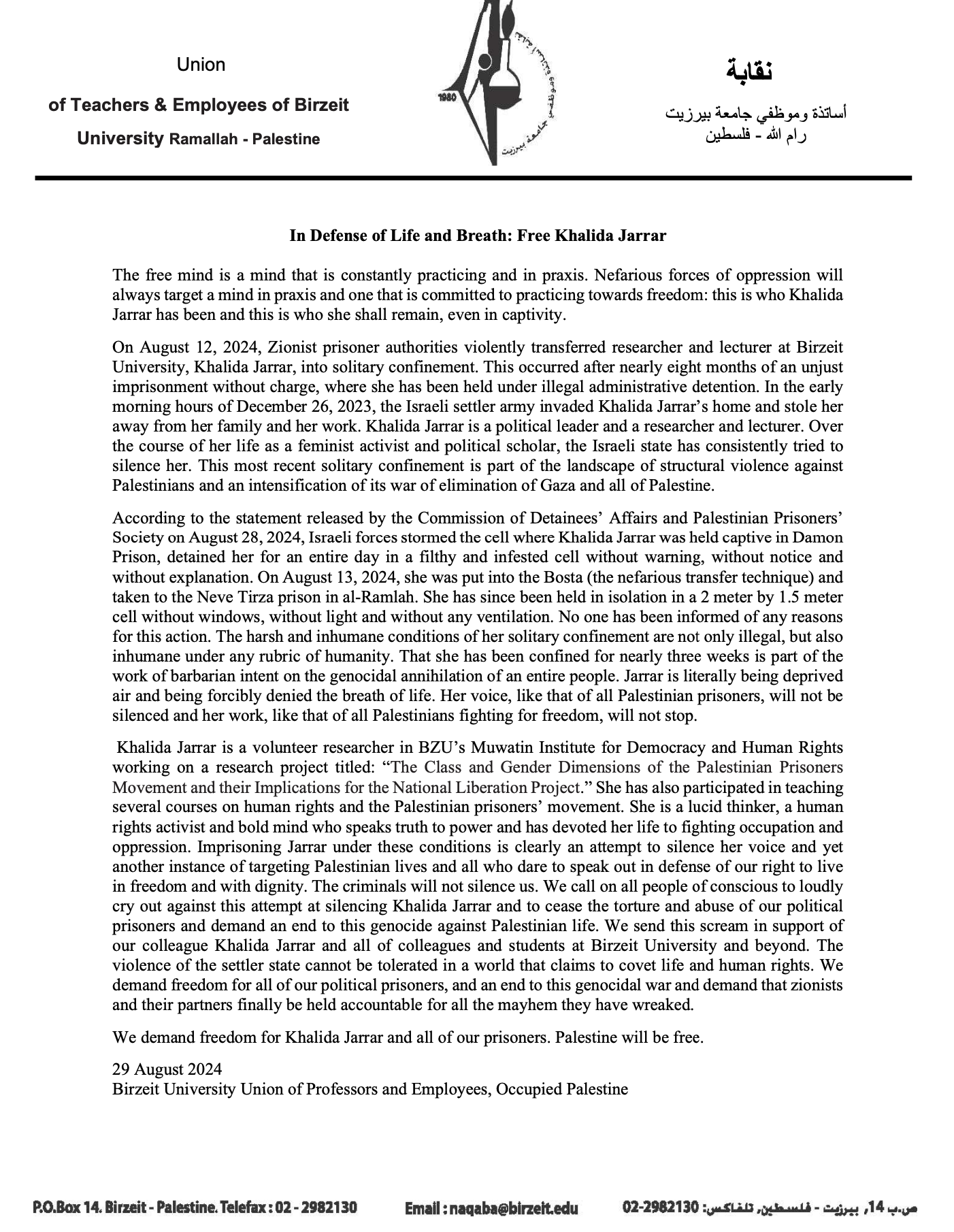The free mind is a mind that is constantly practicing and in praxis. Nefarious forces of oppression will always target a mind in praxis and one that is committed to practicing towards freedom: this is who Khalida Jarrar has been and this is who she shall remain, even in captivity.
On August 12, 2024, Zionist prisoner authorities violently transferred researcher and lecturer at Birzeit University, Khalida Jarrar, into solitary confinement. This occurred after nearly eight months of an unjust imprisonment without charge, where she has been held under illegal administrative detention. In the early morning hours of December 26, 2023, the Israeli settler army invaded Khalida Jarrar’s home and stole her away from her family and her work. Khalida Jarrar is a political leader and a researcher and lecturer. Over the course of her life as a feminist activist and political scholar, the Israeli state has consistently tried to silence her. This most recent solitary confinement is part of the landscape of structural violence against Palestinians and an intensification of its war of elimination of Gaza and all of Palestine.
According to the statement released by the Commission of Detainees’ Affairs and Palestinian Prisoners’ Society on August 28, 2024, Israeli forces stormed the cell where Khalida Jarrar was held captive in Damon Prison, detained her for an entire day in a filthy and infested cell without warning, without notice and without explanation. On August 13, 2024, she was put into the Bosta (the nefarious transfer technique) and taken to the Neve Tirza prison in al-Ramlah. She has since been held in isolation in a 2 meter by 1.5 meter cell without windows, without light and without any ventilation. No one has been informed of any reasons for this action. The harsh and inhumane conditions of her solitary confinement are not only illegal, but also inhumane under any rubric of humanity. That she has been confined for nearly three weeks is part of the work of barbarian intent on the genocidal annihilation of an entire people. Jarrar is literally being deprived air and being forcibly denied the breath of life. Her voice, like that of all Palestinian prisoners, will not be silenced and her work, like that of all Palestinians fighting for freedom, will not stop.
Khalida Jarrar is a volunteer researcher in BZU’s Muwatin Institute for Democracy and Human Rights working on a research project titled: “The Class and Gender Dimensions of the Palestinian Prisoners Movement and their Implications for the National Liberation Project.” She has also participated in teaching several courses on human rights and the Palestinian prisoners’ movement. She is a lucid thinker, a human rights activist and bold mind who speaks truth to power and has devoted her life to fighting occupation and oppression. Imprisoning Jarrar under these conditions is clearly an attempt to silence her voice and yet another instance of targeting Palestinian lives and all who dare to speak out in defense of our right to live in freedom and with dignity. The criminals will not silence us. We call on all people of conscious to loudly cry out against this attempt at silencing Khalida Jarrar and to cease the torture and abuse of our political prisoners and demand an end to this genocide against Palestinian life. We send this scream in support of our colleague Khalida Jarrar and all of colleagues and students at Birzeit University and beyond. The violence of the settler state cannot be tolerated in a world that claims to covet life and human rights. We demand freedom for all of our political prisoners, and an end to this genocidal war and demand that zionists and their partners finally be held accountable for all the mayhem they have wreaked.
We demand freedom for Khalida Jarrar and all of our prisoners. Palestine will be free.
29 August 2024
Birzeit University Union of Professors and Employees, Occupied Palestine
